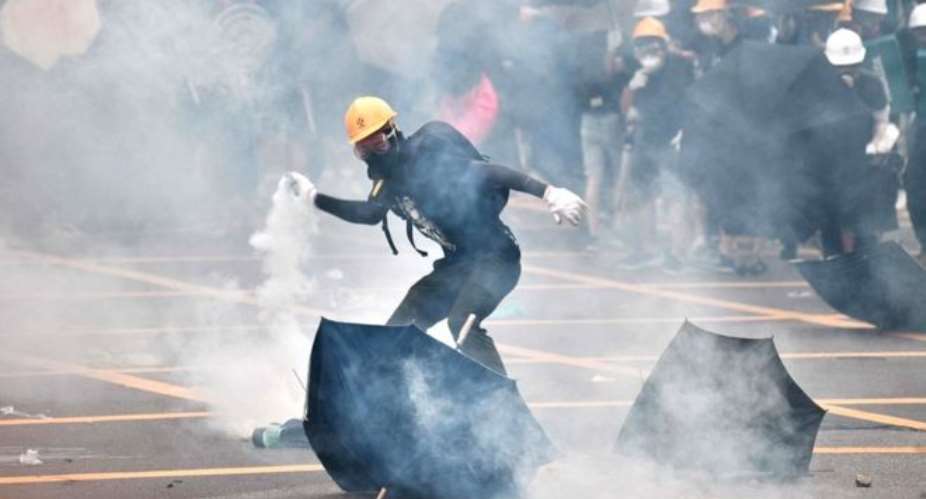China has passed a controversial security law giving it new powers over Hong Kong, deepening fears for the city’s freedoms, the BBC has learned.
Last month China stunned the city when it said it would criminalise any act of secession, subversion, terrorism or collusion with foreign forces.
The move came after angry protests last year – sparked by another law – which became a pro-democracy movement.
Critics say this new law poses an even greater threat to Hong Kong’s identity.
They warn it will undermine Hong Kong’s judicial independence and destroy the city’s unique freedoms, not seen on mainland China.
A draft of the law was not made public before it was pushed through, which means people in the city will not have seen details of the measures they now have to abide by.
Hong Kong was handed back to China from British control in 1997, but under a special agreement that guaranteed certain rights for 50 years.
So the law has drawn harsh international condemnation and also sparked demonstrations in Hong Kong since it was announced by Beijing in May.
China says the law is needed to tackle unrest and instability in the city and reject criticism as interference in its affairs. What does the new law do?
China has not officially confirmed the law has been passed, but the BBC has been told that it went through unanimously in a session of the Standing Committee of the National People’s Congress in Beijing.
It is expected to be added to Hong Kong statute books later in the day and comes a day before the 23rd anniversary of the handover from Britain to China – a date usually marked by pro-democracy protests.
It would make criminal any act of secession, subversion of the central government, terrorism, and collusion with foreign or external forces.
A new office in Hong Kong would deal with national security cases, but would also have other powers such as overseeing education about national security in Hong Kong schools.
In addition, the city will have to establish its own national security commission to enforce the laws, with a Beijing-appointed adviser.
Hong Kong’s chief executive will have the power to appoint judges to hear national security cases, a move that has raised fears about judicial independence.
Importantly, Beijing will have power over how the law should be interpreted. If the law conflicts with any Hong Kong law, the Beijing law takes priority.
How will it change Hong Kong?
For many, the very nature of the law undermines the freedoms that set Hong Kong apart from the rest of China – and helped defined the character of the city.
People in Hong Kong prized civil liberties such as free speech, the right to protest and an entirely independent and robust judiciary.
Critics say that in effect this law could silence dissent and will extend the influence of the Chinese Communist Party over various aspects of Hong Kong life.
Hong Kong’s Chief Executive Carrie Lam has previously dismissed such fears, saying this was a “responsible” move to protect the law-abiding majority.
She has said that Hong Kong’s freedoms, vibrancy and core values will be preserved.
---BBC





 Tuesday’s downpour destroys ceiling of Circuit Court '8' in Accra
Tuesday’s downpour destroys ceiling of Circuit Court '8' in Accra
 SOEs shouldn't compromise on ethical standards, accountability – Akufo-Addo
SOEs shouldn't compromise on ethical standards, accountability – Akufo-Addo
 Father of 2-year-old boy attacked by dog appeals for financial support
Father of 2-year-old boy attacked by dog appeals for financial support
 Jubilee House National Security Operative allegedly swindles businessman over sa...
Jubilee House National Security Operative allegedly swindles businessman over sa...
 Nobody can order dumsor timetable except Energy Minister – Osafo-Maafo
Nobody can order dumsor timetable except Energy Minister – Osafo-Maafo
 Mahama wishes National Chief Imam as he clock 105 years today
Mahama wishes National Chief Imam as he clock 105 years today
 J.B.Danquah Adu’s murder trial: Case adjourned to April 29
J.B.Danquah Adu’s murder trial: Case adjourned to April 29
 High Court issues arrest warrant for former MASLOC Boss
High Court issues arrest warrant for former MASLOC Boss
 Align academic curriculum with industry needs — Stanbic Bank Ghana CEO advocates
Align academic curriculum with industry needs — Stanbic Bank Ghana CEO advocates
 Election 2024: We'll declare the results and let Ghanaians know we've won - Manh...
Election 2024: We'll declare the results and let Ghanaians know we've won - Manh...
